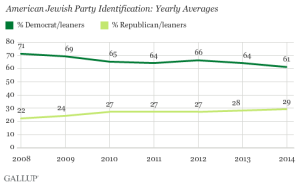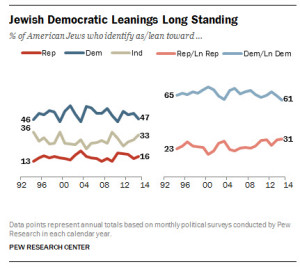Probably not. Kohut fails to confirm the hypothesis he proposes in his headline. Moreover, he spends most of his piece presenting evidence�against�his headline speculation that the proposed deal with Iran �could significantly weaken long-standing Jewish American allegiances to the Democratic Party.� By suggesting such a change, he is insinuating that Jews are single-issue voters, and that issue is Israel.
The reason this headline is clickbait is that American Jews have long been aligned with the Democratic Party and actually tend to be on the left wing of the left-leaning party. Suggesting that an Iran deal might be enough to shake �long-standing Jewish support for the Democratic Party� is tantamount to suggesting that evangelical Christians might start turning out for Hillary Clinton next autumn: it�s theoretically possible, but rather unlikely.
Kohut is not the first to speculate on such a trend;�The Atlantic�asked the same question�back in November, and The Fix at�The Washington Post�posed it in January. Why might we think Jews are moving toward the Republican party? Consider the data from Gallup:

On first glance, the evidence suggests a clear decline in Jewish affinity with the Democratic party from 71% to 61% over six years, mirrored by a rise in Republican affiliation from 22% to 29%. Notice, however, that the time scale is relatively brief and begins in 2008, the year President Obama was elected.
American Jews have two political characteristics that are important here. According to�studies by Pewand others, they (we) tend to be�strongly liberal�there are more than twice as many self-identified liberals as conservatives in the small population of American Jews�and we tend to be�highly politically engaged. Jews,�according to�Johns Hopkins political scientist Benjamin Ginsberg, �account for a huge share of the activist base of the Democratic Party and account for much of the money available to Democratic candidates,�
These two characteristics are key to understanding the Gallup graph above because politically engaged liberal voters are the group most likely to be disappointed in and disillusioned with an Obama presidency, regardless of their religious or ethnic affiliations. These voters believed most strongly in the Obama campaign�s message of change and worked hardest to inspire middle-of-the-road and undecided voters to turn out for his election in 2008. These same voters have been disappointed by the President�s policies on domestic surveillance and drone strikes, and have discovered that they are to his left on economic issues.
The decline pictured above more likely represents Jewish disillusionment with the Obama presidency than a permanent shift toward Republican alignment. Indeed, the same trend is present in the general population over the same period. It�s just slightly more pronounced among Jews (probably for the liberal, politically-engaged reasons above).
If Kohut were correct that Jews are headed to the right and an Iran deal is the last push that will get them over the line, we would expect to see a long, clear trend�in this case, a decline in Democratic support over a decade or more�or else a sharp descent triggered by a major shift in the political landscape. Although negotiations with Iran over its nuclear program are historic, they are by no means a major shift in the domestic political landscape. Nor, indeed, are recent Republican efforts to court the Jewish vote by becoming BFFs with Netanyahu all that revolutionary.
As for the former�a long-term trend�Kohut himself admits that, �despite growing support for Israel among Republicans over the past decade, there is little sign that Jews have become more attracted to the Republican Party in recent years.� He demonstrates how little change there�s been with data from his own Pew Research Center:

Jews are about as Democratically-aligned now as they were 20 years ago. If the Republicans were to make a serious play for Jewish loyalty, they would have to bridge a 30-point chasm in political identity.
And it�s not just Kohut�s own polling shop that demonstrates this stability in allegiance.�A study for the Solomon Project�in July 2012 examined Jewish American voting behavior between 1972 and 2008. Correcting for third-party candidates, this study found that there were two distinct periods in Jewish presidential voting. Between 1972 and 1988, �the GOP captured 31�46% [of the two-party Jewish presidential vote]�but only 16�24% from 1992 to 2008.� In other words, Jews have become�even more Democratic in the last 20 years than they had been before. Furthermore, �Jewish voters remain much more Democratic than the rest of the electorate� (on the order of 22�32 points more Democratic in presidential races since 1984). And�Jews have been even more supportive of Democratic congressional candidates�than of presidential;�71�88%�of the Jewish vote has gone to Democratic congressional candidates since 2002.
What Kohut is insinuating�what one must insinuate in order to believe this prediction�is that American Jews are single-issue voters, and that that issue is Israel. It�s a common myth in the media, but it doesn�t fit the facts. Even Kohut tells us that, �While most Jews are indeed strong backers of Israel, the polling data suggests that the generally liberal ideology of Jewish Americans continues to align with their long-standing affinity to the Democratic Party.� What�s more, as Ester Fuchs, political scientist at Columbia University,�points out in�The Atlantic, �Efforts to shift the Jewish vote over to Israel haven�t really worked�The more assimilated Jews are, the less important Israel is to them.�
By Lobe Log










